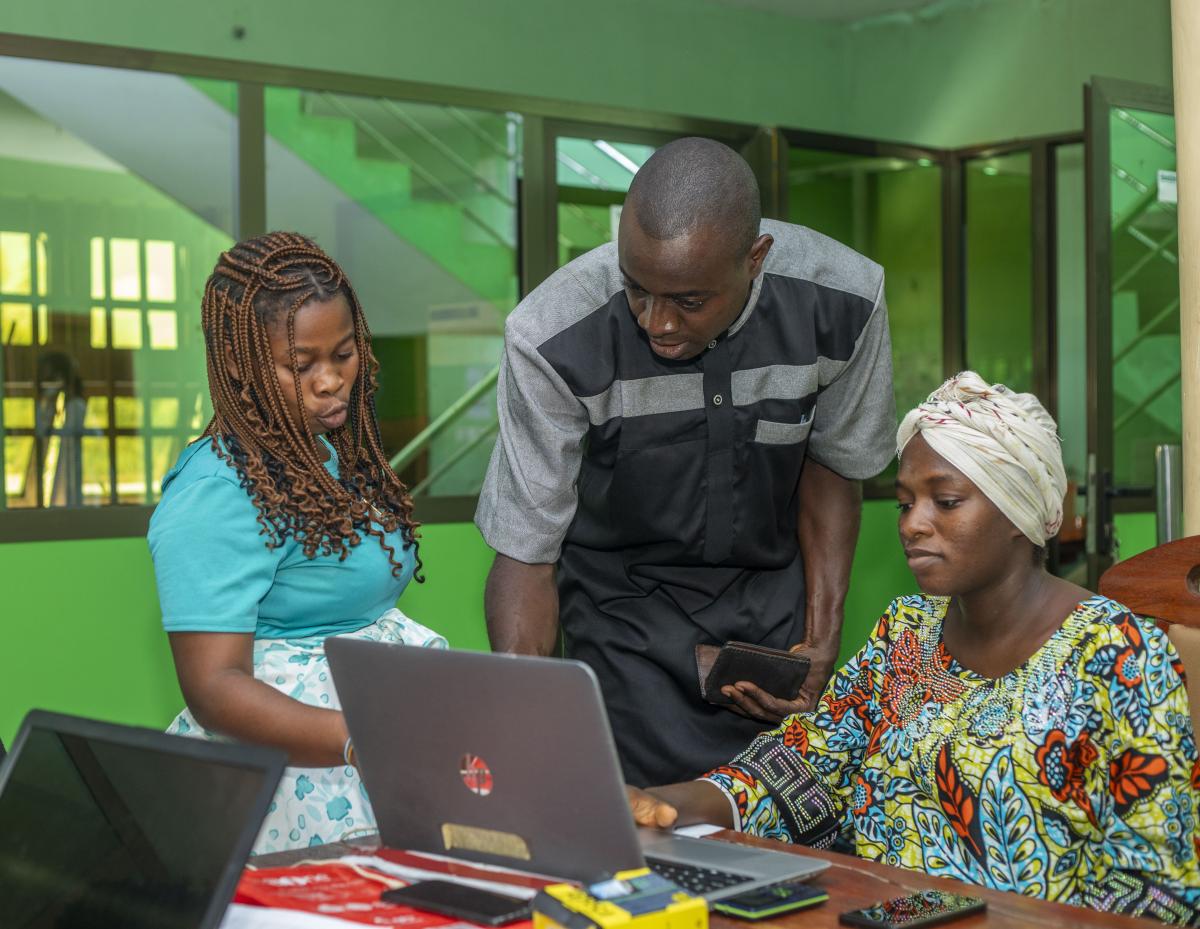Opzoeken
45 - 60 van 3120 nieuws bekijken
-
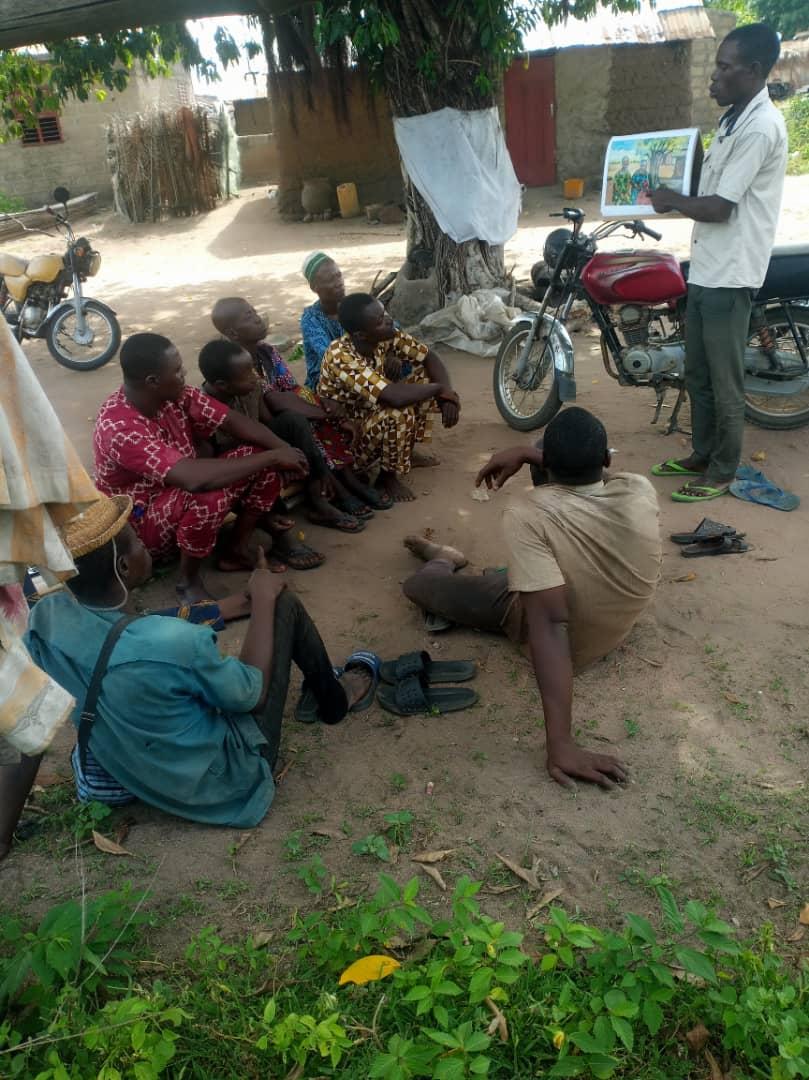
Quand les communautés au Bénin deviennent actrices du changement
Reece-hermine ADANWENON | 25/12/2025
L'histoire des Comités Zéro VBGDans la commune de Savè, département des Collines au Bénin, quelque chose d'habituel s'est produit en février 2024. Trois personnes, élues par leur communauté, ont décidé de briser le silence qui entourait trop souvent les violences basées sur le genre. Pas des experts venus de la capitale. Pas des agents de l'État. Juste des membres ordinaires de la communauté, animés par une conviction : que chaque survivante de violence méritait protection, orientation et justice. Ils sont devenus ce qu'on appelle aujourd'hui les « Comités Zéro VBG » et leur histoire pourrait bien transformer la lutte contre les violences de genre dans tout le département.Le déclic : une approche lieu du terrainFatou (nom d'emprunt), membre d'un des premiers comités, se souvient de ce jour où une jeune femme de son quartier est venue frapper à sa porte, le visage tuméfié, ne sachant pas vers qui se tourner. « Avant, nous aurions probablement essayé d'arranger les choses à l'amiable avec la famille. Mais cette fois, nous savons quoi faire. Nous l'avons accompagné au Guichet Unique Protection Sociale, puis au centre de santé, et nous avons assuré le suivi jusqu'au bout. » C'est là toute la force du modèle des Comités Zéro VBG : transformer des citoyens volontaires en véritables relais communautaires, capables d'identifier les cas de violence, d'orienter les survivantes vers les services appropriés tels que les centres de santé, les commissariats, les services sociaux et surtout, de rester à leurs côtés tout au long du processus.Les résultats n’ont pas tardé. Depuis février 2024 à décembre 2025 où cette aventure a démarré avec l'appui du projet EQUITE 2, 248 personnes ont été prises en charge pour ces cas de violences basées sur le genre au Centre Intégré de Prise en Charge (CIPeC) des VBG construit et équipé par le Projet. 43 membres du personnel du CIPeC et de l'hôpital de Dassa dont 30 agents de santé, 2 assistants sociaux, 2 psychologues, 4 officiers de police judiciaire, 1 magistrat et 4 cadres administratifs de l'hôpital ont été formés sur les procédures opérationnelles standardisées. De même, 40 agents de police ont été formés sur l'accueil, l'écoute et la prise en charge des VBG. 144 acteurs communautaires membres des Comités Zéro VBG ont été également formés et 25 acteurs de la Direction Départementale des Affaires Sociales et de la Microfinance des Collines et des Guichets Uniques Protection Sociale sont formés sur la planification opérationnelle, le suivi et l'évaluation des interventions de lutte contre les VBG. Tous les cas de VBG portés à la connaissance des comités ont été référés et suivis. Plus impressionnant encore : la communauté elle-même a commencé à reconnaître et à solliciter ces nouveaux acteurs. Les arrangements à l'amiable, qui maintenaient souvent l'impunité, ont laissé place à des dénonciations et à une véritable collaboration avec les autorités policières.« Ce qui nous a le plus frappés, c'est que les gens ont compris que la violence n'est pas une affaire privée, mais un problème de société », explique un commissaire d'arrondissement ayant participé à l'expérience. « Les comités ont réussi là où parfois les institutions peinaient à créer un climat de confiance. », a -t-il martelé.Le succès des acteurs communautaires inspire les institutionsL'impact a été tel que la Direction Départementale des Affaires Sociales et de la Microfinance des Collines (DDASM) a décidé de faire de cette initiative pilote une stratégie départementale. En décembre 2024, les commissaires d'arrondissement, représentants des Guichets Uniques Protection Sociale, ONG spécialisées et les huit comités pionniers, devenus de véritables experts communautaires, se sont réunis pour un atelier historique. Objectif : capitaliser sur cette expérience, affiner le modèle et tracer la voie pour son extension à l'ensemble du département des Collines et à la zone sanitaire de Tchaourou.« Ce n'est pas souvent qu'une approche développée au niveau local convainc les autorités départementales au point qu'elles décident de l'adopter formellement », souligne Mme Aziza Souleymane Experte Genre & Santé au projet EQUITE II, financé par l'Agence Française de Développement et mis en euvre par Enabel. « C'est la preuve que lorsque les solutions viennent des communautés elles-mêmes, elles ont plus de chances de durer. », a-t-elle ajouté. Les sessions de discussion ont permis d'aller plus loin que le simple constat de réussite. Ensemble, tous les acteurs des institutions de la société civile et des comités communautaires ont co-construit une méthodologie standardisée, élaboré des outils pratiques et défini une feuille de route claire jusqu'en 2027. Cette démarche participative garantit que le modèle pourra être fidèlement répliqué tout en s'adaptant aux réalités de chaque commune. Elle marque aussi une étape décisive vers l'institutionnalisation de l'approche, gage de pérennité au-delà du projet EQUITE II.L'effet domino : vers un département zéro VBGLes prochains mois s'annoncent décisifs. Le modèle sera étendu progressivement à toutes les communes du département. Des visites de terrain avec les autorités départementales sont prévues pour renforcer le plaidoyer en faveur d'un financement durable de la lutte contre les VBG. Un référentiel de mise en œuvre sera élaboré pour servir de guide à toutes les futures réplications. Mais au-delà des plans et des documents officiels, c'est une culture véritable du refus de la violence qui est en train de naître. Dans les marchés, les écoles, les centres de santé de Savè, on parle désormais ouvertement du VBG. On connaît les membres des comités. On sait qu'il existe des recours, que personne ne doit rester seul face à la violence. L'histoire des Comités Zéro VBG de Savè démontre une vérité simple mais puissante : le changement social durable ne peut se décréter d'en haut. Il naît lorsque les communautés elles-mêmes deviennent actrices de leur transformation, soutenues par des institutions qui croient en leur capacité d'agir. Fatou, qui continue ses activités bénévolement au sein de son comité, résume bien cet espoir : « nous ne sommes pas des super-héros. Nous sommes juste des gens qui ont décidé de ne plus fermer les yeux. Et quand toute une communauté décide ça, les choses changent vraiment. ». Dans les Collines du Bénin, une révolution silencieuse est en marche. Et elle porte un nom : Zéro VBG.
-
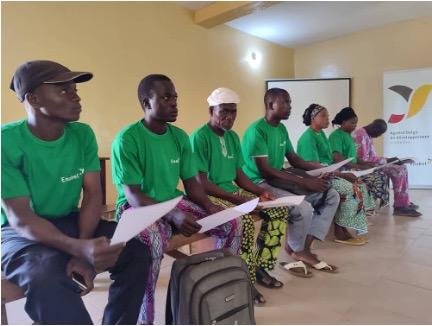
L'histoire d'une transformation communautaire à Parakou et N'dali
Reece-hermine ADANWENON | 25/12/2025
Dans les villages de Parakou et N'dali, au nord du Bénin, les chiffres parlent d'eux-mêmes. Les violences basées sur le genre frappent silencieusement, jour après jour. Les femmes hésitent à utiliser la contraception, souvent par crainte du regard ou de la réaction de leur conjoint. Les tensions conjugales éclatent, parfois violemment. Et dans cette spirale, ce sont des familles entières qui souffrent. Face à cette réalité, une question s'impose : comment briser ce cycle ? La réponse du projet P@SRIS II d'Enabel en collaboration avec le ministère de la santé est aussi audacieuse qu'innovante : impliquer les hommes comme alliés du changement, et non les pointeurs comme seuls responsables.Une double stratégie au cœur des communautésLoin des bureaux climatisés, c'est sur le terrain, au plus près des réalités villageoises, que P@SRIS II a déployé une approche inédite. Après un diagnostic minutieux révélant 31 villages marqués par une récurrence inquiétante de violences basées sur le genre et 10 autres où la contraception reste taboue, le projet a mis en place deux dispositifs complémentaires. D'un côté, 31 comités de veille VBG se sont constitués. Composés d'hommes et de femmes de la communauté, ces sentinelles du quotidien ont pour mission de détecter les signaux d'alerte, d'accompagner les victimes, de faciliter les médiations et d'orienter les cas vers les structures compétentes. Ils sont les yeux et les oreilles qui veillent, les mains qui soutiennent. De l'autre, 10 Clubs des Hommes et Femmes Modèles ont vu le jour. Leur raison d'être ? Promouvoir une masculinité positive, celle qui célèbre la force dans l'empathie, le courage dans la vulnérabilité, et la virilité dans le respect. Ces clubs deviennent des espaces de dialogue où les hommes apprennent à déconstruire les stéréotypes qui les enferment autant qu'ils oppriment leurs compagnes.Former pour transformer163 acteurs du changement, 93 membres de comités de veille et 70 ambassadeurs de la masculinité positive ont été formés et outillés. Mais ces formations vont bien au-delà de la simple transmission de connaissances techniques. Dans les salles de formation, les discussions ont été intenses, parfois inconfortables. Des hommes ont partagé comment ils ont grandi avec l'idée qu'un "vrai homme" ne pleure pas, ne consulte pas sa femme sur les décisions familiales, et impose sa volonté. Des femmes ont raconté les violences silencieuses qu'elles endurent, mais aussi leur espoir de voir leurs fils grandir différemment. Ces échanges ont permis de comprendre que les violences basées sur le genre ne sont pas une fatalité culturelle, mais le produit de normes sociales qui peuvent et doivent évoluer. Les participants ont découvert qu'ils peuvent être des modèles alternatifs dans leurs communautés, des voix qui portent un autre récit de ce que signifie être un homme ou une femme au XXIe siècle.Une vision convergente pour les Objectifs de Développement DurableCette initiative s'inscrit dans l'ambition partagée par Enabel et le gouvernement béninois d'accélérer l'atteinte des ODD liés à la santé, au bien-être et à l'égalité des sexes. Alors que nous sommes à mi-parcours de l'Agenda 2030, les défis persistants : accès limité à la contraception, qualité des soins inégale, violences encore trop souvent banalisées. Mais P@SRIS II ne se contente pas de constater. Le projet pose un acte de foi dans la capacité des communautés à se transformer de l'intérieur, quand elles sont soutenues et outillées. Il reconnaît que les droits sexuels et reproductifs ne peuvent progresser sans l'adhésion et l'engagement actif des hommes.Le rôle central des hommes : de spectateurs à acteursPourquoi impliquer les hommes ? Parce que l'égalité de genre n'est pas une affaire de femmes. Parce que les hommes sont aussi prisonniers de modèles de masculinité toxiques qui les coupent de leurs émotions, de leurs proches, de leur humanité. Parce qu'ils peuvent être, et sont déjà des pères, des époux, des frères qui veulent mieux pour leurs filles, leurs compagnes, leurs sœurs. Dans les villages de Parakou et N'dali, des hommes commencent à parler autrement. Ils acceptent que leurs épouses utilisent la contraception. Ils participent aux tâches ménagères. Ils s'interviennent quand un voisin lève la main sur sa femme. Ils deviennent des modèles de masculinité positive, celle qui protège sans dominer, qui aime sans posséder, qui guide sans imposer. Les graines du changement sont plantées. Dans deux mois, les équipes de P@SRIS II retourneront sur le terrain pour observer ces 163 acteurs en action : comment les comités de veille gèrent-ils les cas de violences ? Les modèles de clubs d'hommes et de femmes arrivent-ils à influencer les normes sociales dans leurs villages ? Quels obstacles rencontrent-ils ? Cette supervision ne sera pas un simple contrôle, mais un moment d'apprentissage mutuel, d'ajustement des stratégies et de célébration des premières victoires. Car chaque homme qui refuse la violence, chaque femme qui accède à la contraception sans crainte, chaque enfant qui grandit dans un foyer plus égalitaire est une victoire.Une transformation qui commence dans les cœursL'histoire de ces changements à Parakou et N'dali nous rappelle une vérité essentielle : le changement social ne se décrète pas, il se construit patiemment, pas à pas, dans les conversations entre voisins, dans les décisions familiales, dans les gestes du quotidien.En mettant sur la masculinité positive et en structurant des dispositifs communautaires de veille, le projet fait le pari audacieux que les communautés elles-mêmes détiennent les clés de leur émancipation. Il ne s'agit pas d'imposer des valeurs extérieures, mais d'accompagner l'émergence de nouvelles normes, plus justes, plus humaines, plus durables. Parce que lutter contre les violences basées sur le genre, c'est aussi libérer les hommes des carcans qui les étouffent. C'est leur offrir la possibilité d'être pleinement humains, vulnérables, aimants, responsables. C'est construire ensemble une société où personne ne doit choisir entre son identité et sa dignité.
-
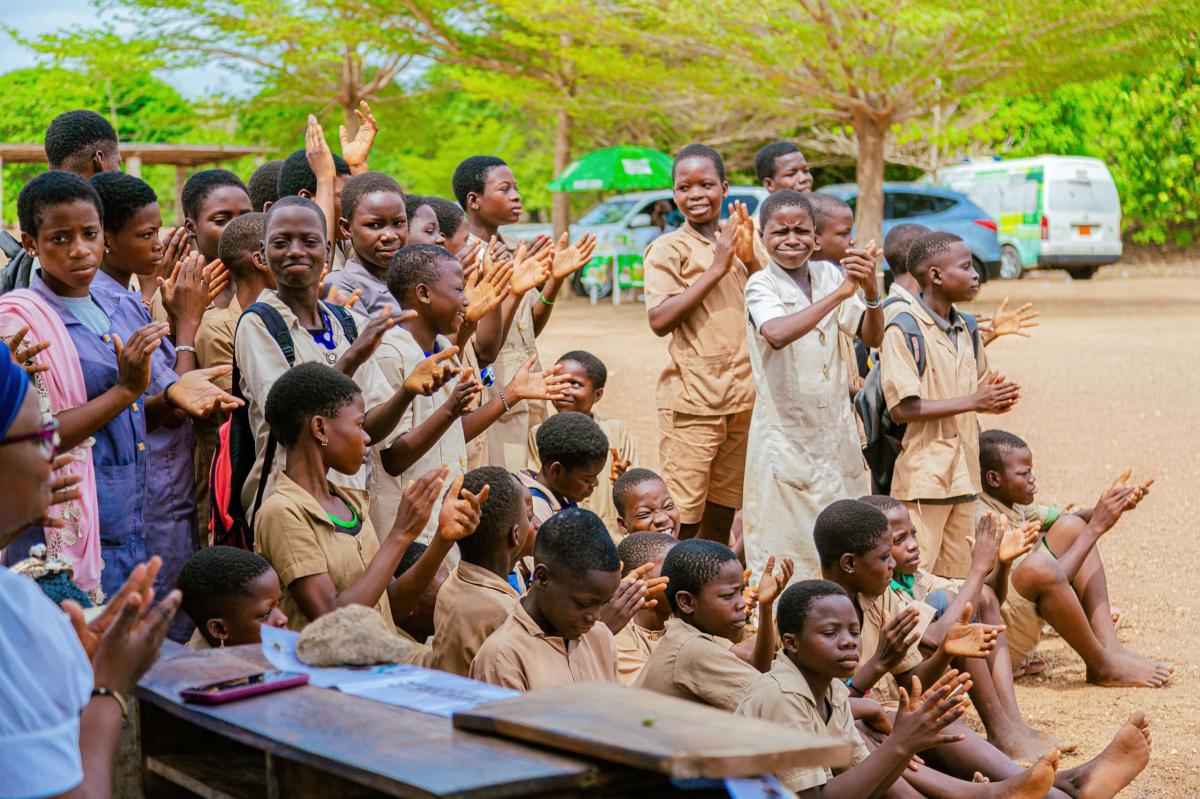
Quand Aïcha a levé la main : un geste simple qui a tout changé
Reece-hermine ADANWENON | 25/12/2025
Ce jour-là, au CEG Ouorgui, dans la commune de Savè personne n'a oublié la scène.Au moment d'ouvrir la cérémonie de distinction des élèves meilleures filles, Aïcha, une élève timide de troisième, lève doucement la main : « madame… pourquoi est-ce que nous, les filles, sommes si peu ici ? ». Un silence s'installe. La question, simple et poignante, résume à elle seule la réalité des filles scolarisées en milieu rural. Derrière les sourires, les trophées et les écharpes de distinction, une vérité douloureuse s'impose : malgré les efforts déployés, de plus en plus de filles disparaissent du système éducatif au fil des classes.C'est dans ce contexte que la préfecture du département des Collines, accompagnée du projet EQUITE 2, financé par l'Agence Française de Développement « AFD » et mis en œuvre par l'Agence Belge de Développement « Enabel » a organisé une cérémonie exceptionnelle pour mettre en lumière l'excellence féminine et révéler les défis encore trop méconnus de l'éducation des filles en milieu rural.L'événement a rassemblé des autorités départementales, responsables communaux, enseignants, parents et femmes leaders lieux témoigne de leur parcours et encourage les filles à poursuivre leurs études. Mais au fur et à mesure que les résultats scolaires étaient annoncés, le tableau s'est obscurci : aucune fille de terminale n'a atteint la moyenne requise pour être primée; en classe de troisième, la meilleure élève affiche seulement 9/20; les effectifs féminins chutent drastiquement à mesure que l'on avance dans le cursus. Ce constat, brutal mais nécessaire, a transformé la cérémonie en un véritable espace de réflexion collectif.Un dialogue franc qui débouche sur des engagements concretsFace aux performances inquiétantes et à la faible représentativité des filles, les échanges ont rapidement évolué vers une discussion de fond impliquant, les autorités, les enseignants et les dirigeants communautaires. Les défis de responsabilité évoqués sont bien connus mais souvent sous-estimés : mariages et grossesses précoces sûres, pauvreté et fuite de parentale, absence d'espacess pour les jeunes, faible estime de soi, manque d'encadrement sur les questions de leadership, poids des normes sociales exercées.À l'issue de ces discussions, une feuille de route a été élaborée, assortie d'engagements à l'échelle communautaire, institutionnelle et départementale pour renforcer l'accès, le maintien et la réussite des filles à l'école.En soutenant cette initiative, le projet EQUITE 2 s'inscrit dans une démarche plus large : promouvoir l'égalité des chances, renforcer les systèmes éducatifs locaux et mobiliser les autorités afin que l'éducation des filles devienne une priorité partagée, non plus seulement un discours. Car chaque fille qui reste à l'école est une future citoyenne, une future actrice du développement, un moteur pour sa communauté.
-
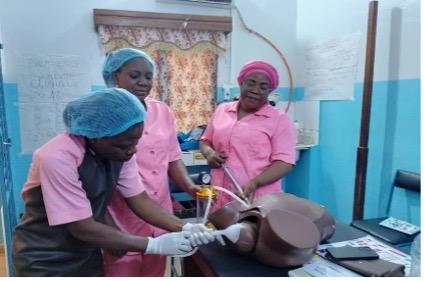
Parakou–N’Dali : là où les soins sauvent, où la prévention protège
Reece-hermine ADANWENON | 25/12/2025
Dans les couloirs des maternités de Parakou-N'Dali, un changement profond est en marche.Pendant longtemps, trop de femmes arrivaient pour donner la vie… et repartaient sans la leur. L'hémorragie post partum restait un ennemi redoutable, et dans les centres de santé, le dépistage du cancer du col de l'utérus demeurait quasiment absent.Face à cette réalité, le Ministère de la santé avec l'appui d'Enabel à travers le projet P@SRIS II, a choisi d'agir là où l'impact immédiat serait : renforcer la qualité des soins et rendre la prévention accessible à toutes.Dans de nombreuses maternités, l'absence de matériel essentiel ou de personnel suffisamment formé rend les complications dangereusement imprévisibles.Le P@SRIS II a donc lancé une dynamique structurante :• équiper les salles d'accouchement en dispositifs SONU (Soins Obstétricaux Néo nataux d'Urgence),• présenter des solutions innovantes comme le tamponnement intra utérin au préservatif (TIUB) et le drap calibré,• accompagner les prestataires à travers un mentorat clinique intensif, se concentrer sur la pratique réelle et la maîtrise du geste technique,• suivre régulièrement la qualité des soins dans trente centres pour garantir des progrès constants.Les résultats parlent d'eux mêmes : - 88 % des formations sanitaires disposant désormais de matériel SONU complet,- 90 % sont équipés pour faire face aux hémorragies, et - 81 % des cas d'hémorragie Post Partum (HPP) sont pris en charge efficacement.Derrière ces chiffres se cachent des histoires de mères sauvées et de nouveaux nés accueillis dans des conditions bien plus sûres.Protéger avant qu'il ne soit trop tard : le réveil face au cancer du colPendant que les équipes renforçaient l'urgence, un autre danger, silencieux, continuait de gagner du terrain : le cancer du col de l'utérus. Les constats étaient alarmants : très peu de femmes dépistées, aucun dépistage intégré en consultation prénatale, et des ruptures d'intrants pendant des mois. En collaboration avec le Ministère de la Santé, le programme P@SRIS II a alors engagé un véritable virage :• disponibilité continue des kits de dépistage,• intégration systématique du test lors de la première consultation prénatale,• des campagnes de sensibilisation pour encourager les femmes à se faire dépister,• renforcement des équipes sur l'accueil, la dignité et la communication.Avec cet appui, les centres dépistent à nouveau, les prestataires sont mobilisés, et 80 % des femmes expriment une satisfaction élevée de la qualité humaine des services reçus.Un même objectif : sauver, protéger, prévenirEn renforçant les SONU et en faisant du dépistage du cancer du col une pratique routinière, le P@SRIS II contribue à écrire une nouvelle page pour la santé maternelle dans la Zone Sanitaire Parakou-N'Dali. Une page où l'urgence est mieux maîtrisée, où la prévention devient un réflexe, et où chaque femme peut recevoir les soins qu'elle mérite avec compétence, respect et dignité.
-
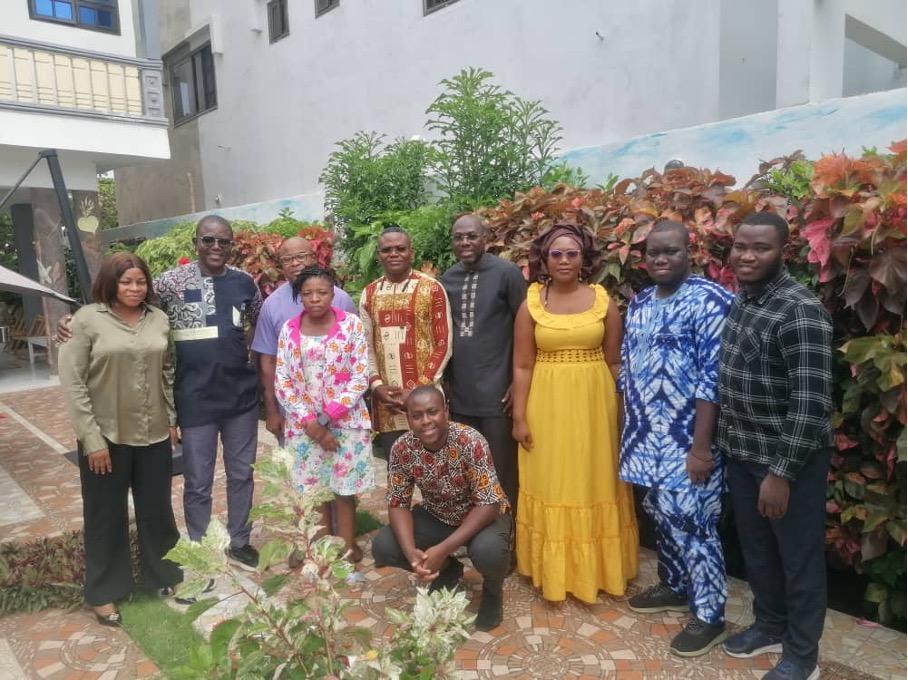
eQuapitalise : quand le digital transforme la santé mère-enfant au Bénin
Reece-hermine ADANWENON | 25/12/2025
Grand-Popo, octobre 2025 , Docteur Adjoavi (non d'emprunt) fixe l'écran devant elle. Le tableau de bord numérique retrace le parcours d'une mère qu'elle n'a pas pu sauver trois mois plus tôt. Mais cette fois, personne ne la juge. Le système lui montre où l'ensemble de la chaîne de soins a failli et surtout, comment éviter que cela se reproduise. C'est la promesse d' eQuapitalise , la plateforme numérique finalisée lors d'un atelier décisif les 30-31 octobre à Grand-Popo, fruit du partenariat entre le CERRHUD et l'Agence belge de coopération internationale « Enabel » à travers le projet Programme d'appui à la santé sexuelle et reproductive et à l'information sanitaire P@SRIS II. Le problème : des audits qui paralysent au lieu de sauverAu Bénin, chaque décès maternel ou néonatal déclenche théoriquement un audit. Dans la réalité, c’est souvent une chasse au coupable. « On cherche la sage-femme de garde, le médecin absent, l'erreur individuelle », confie Mme Gyslaine, sage-femme rencontrée au centre de santé d'Akassato dans le département de l'Atlantique. « Puis on range le rapport dans un tiroir. Les mêmes dysfonctionnements se répètent, mais les équipes ont été informées à se taire. », a-t-elle indiqué. Résultat ? Une culture du silence où les leçons ne sont jamais vraiment tirées. Les ruptures de stock persistantes. Les protocoles défaillants restent en place. Et derrière chaque statistique, des drames humains qui auraient pu être évités.La solution : une révolution systémique et numériqueeQuapitalise digitalise la méthodologie de la « Revue à Haut Impact », une approche qui change radicalement la donne. Au lieu de chercher un coupable, elle analyse le système dans son ensemble : disponibilité des ambulances, gestion des stocks de médicaments, communication inter-services, compétences du personnel. L'innovation majeure avec cette plateforme, est qu'elle ne se concentre pas uniquement sur les échecs. Elle capitalise aussi les succès. Une sage-femme qui a brillamment géré une hémorragie, son protocole devient une référence partagée. Un centre de santé sans rupture de stock, son système de gestion inspire les autresLa plateforme offre trois avancées décisives :- une analyse systémique : chaque cas critique est décoré pour identifier les maillons faibles de toute la chaîne de soins, du village à l'hôpital régional;- la capitalisation des bonnes pratiques : pour la première fois, les réussites sont documentées avec autant de rigueur que les échecs et transformés en modules de formation.- la redevabilité sans punition : les données sont anonymisées au niveau individuel mais agrégées institutionnellement, permettant d'améliorer le système sans stigmatiser les personnes. L'impact : chaque leçon sauve des vies Pour les soignants, fini la peur de l'audit. Place à un système qui les accompagne, les forme en continu et valorise leurs réussites. Pour les gestionnaires, c'est un outil de pilotage en temps réel qui permet d'anticiper les crises, d'allouer les ressources efficacement et de prendre des décisions basées sur des données fiables. Pour les familles béninoises, c'est l'espoir concret que chaque accouchement se déroule dans les meilleures conditions, que chaque mère et chaque nouveau-né bénéficie de soins de qualité. « Notre ambition est claire », explique Wilfried NASSARA, expert Digitalisation et Santé au projet P@SRIS II. Selon lui, cette plateforme permettra de transformer chaque décès évitable en une leçon qui sauve des vies. Ce qui implique désormais de Passer d'une logique punitive à un apprentissage continu., at-il ajouté. Porté par Enabel, P@SRIS II fait du numérique un levier d'équité et d'efficacité dans le système de santé béninois. De la télémédecine à la gestion électronique des dossiers patients, chaque innovation technologique est pensée pour servir d'abord à ceux qui en ont le plus besoin.
-
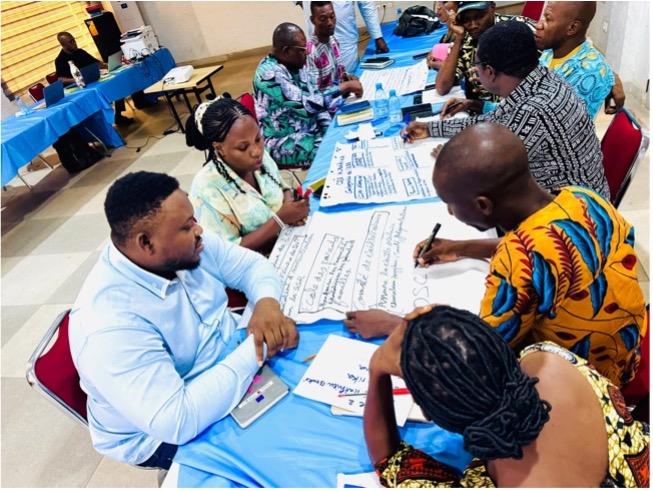
Renforcer l'éducation à la santé sexuelle dans le Borgou : une dynamique locale en marche
Reece-hermine ADANWENON | 25/12/2025
Dans la cour du CEG Guêma, 4 400 élèves se croisent chaque jour. Parmi eux, six jeunes filles ont vu leur scolarité interrompue en 2023 par une grossesse précoce. Enseignante depuis quinze ans au CEG Guêma, Madame Sanni a vu trop de jeunes filles quitter les bancs de l'école, le ventre rond et les rêves en suspens. Une réalité qui se répète dans les dix collèges de Parakou et N'Dali. Mais depuis juin 2025, quelque chose change : enseignants, parents, élèves et autorités locales ont décidé d'agir ensemble. Les 24 et 25 juin 2025, plus de 35 acteurs du Borgou se sont réunis à Parakou. Autour de la table : des enseignants fatigués de voir leurs élèves abandonner l'école, des parents inquiets mais parfois démunis face aux questions de leurs enfants, des directeurs d'établissement cherchant des solutions concrètes, et des jeunes réclamant une éducation qui leur parle vraiment. Organisée par Enabel et l'Institut National d'Ingénierie de Formation et de Renforcement des Capacités des Formateurs (INIFRCF), cette session n'était pas une simple réunion de plus. C'était une invitation à co-construire une réponse collective à un défi majeur : comment permettre aux adolescents du Borgou de grandir en sécurité, informés de leurs droits sexuels et reproductifs, capables de faire des choix éclairés ? Une approche qui rompt avec les habitudes Fini les cours magistraux descendants et mal à l'aise. Place à une approche hybride qui combine formation en ligne via une plateforme numérique développée par l'INIFRCF, et accompagnement humain sur le terrain. Les enseignants ne seront plus seuls : des tuteurs locaux les soutiendront, et des comités de veille seront créés dans chaque établissement. Mais la vraie innovation, c'est d'avoir compris qu'on ne peut pas parler de santé sexuelle aux jeunes sans impliquer tout leur écosystème. Des « écoles des parents » verront le jour pour accompagner les familles. Des outils ludiques tels que le forum théâtre, les podcasts, l'application CareX permettront aux adolescents d'explorer ces sujets sans tabou. Et les communautés, via des partenaires comme Terres Rouges Bénin et l'ABPF, seront mobilisées pour que le dialogue intergénérationnel devienne possible. « Pour la première fois, j'ai senti qu'on ne me demandait pas seulement de transmettre un programme. On m'a donné les moyens d'agir : une plateforme de formation en ligne que je peux à mon rythme, un tuteur local pour m'accompagner, des outils concrets pour parler aux jeunes sans tabou », a confié Madame Sanni. L'Application CareX, les podcasts, théâtre forum créé par les élèves, les comités de veille associés parents et jeunes : le projet P@SRIS-2 déploie une panoplie d'approches pour que l'éducation sexuelle ne soit plus un cours gênant donné du bout des lèvres,mais un espace de dialogue, de respect et de droits. «Mes élèves ne veulent pas qu'on leur fasse la morale. Ils veulent des réponses claires, des informations fiables, et surtout : être écoutés. C'est exactement ce que ces outils permettent », explique Madame Sanni.48 grossesses en 2023 : un chiffre à transformer en espoirDans les dix collèges pilotes sélectionnés, 48 grossesses précoces ont été enregistrées en 2023. Derrière chaque chiffre, une trajectoire brisée, un rêve suspendu. L'objectif du projet P@SRIS-2en collaboration avec les Ministères de la santé, des Affaires Sociales et de la Microfinance est clair : réduire drastiquement ce nombre d'ici 2027, tout en renforçant les compétences de vie de milliers d'adolescents. Le CEG Guêma, avec ses 6 cas, devient un symbole. Non pas de l'échec, mais du potentiel de transformation. Car c'est là, dans ces établissements où les défis sont les plus grands, que l'impact peut être le plus profond. Le défi est immense, l'ambition à la hauteur. D'ici 2027, le projet vise à réduire drastiquement le nombre de grossesses précoces tout en renforçant les compétences de vie de milliers d'adolescents du Borgou. Madame Sanni, elle, s'est fixé un objectif plus personnel : « Je veux que mes élèves de cette année arrivent en terminale. Toutes. Sans interruption. Avec leurs rêves intacts ». Et pour la première fois depuis longtemps, elle y croit vraiment.Une promesse qui se construit jour après jourLes parents ont peur d'aborder ces questions. Ils pensent que parler de sexualité, c'est encourager les jeunes à passer à l'acte. Mais c'est l'inverse : c'est le silence qui tue », résume un participant de l'atelier. « Cette fois, nous ne laissons personne de côté. Parents, enseignants, élèves scolarisés et non-scolarisés, leaders communautaires : tous ont leur place dans cette dynamique. L'Éducation à la Santé Sexuelle ne sera plus un sujet technique réservé aux spécialistes, mais un levier de dialogue, de dignité et de droit. À Parakou, un collectif dynamique est en marche. Portée par des enseignants comme Madame Sanni, des parents qui osent briser le silence, des jeunes qui réclament leurs droits, et des institutions qui mettent les moyens.L'éducation à la santé sexuelle n'est plus un sujet technique. C'est devenu une promesse : celle d'un avenir où chaque adolescent du Borgou pourra choisir sa vie, en toute connaissance de cause.
-
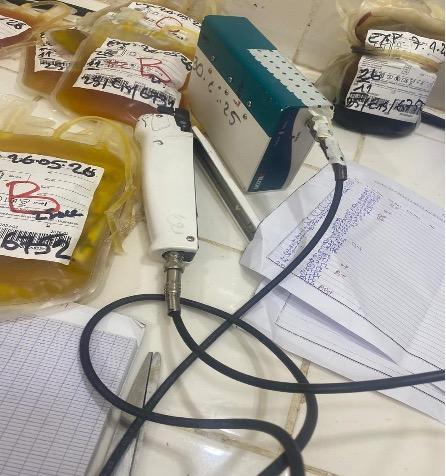
L’urgence au cœur du Borgou : la Technologie redonne vie à la transfusion
Reece-hermine ADANWENON | 25/12/2025
Dans les couloirs des hôpitaux du Borgou, chaque minute compte. Derrière chaque vie sauvée d'une hémorragie ou d'une complication sévère, se cache un maillon essentiel mais souvent invisible : le centre de transfusion sanguine. Imaginez une équipe médicale prête à intervenir, mais dont les mains sont liées. Jusqu'à récemment, le centre de transfusion sanguine du Borgou luttait contre un ennemi silencieux : un plateau technique vieillissant. Avec des équipements défectueux ou hors d'usage, produit du Plasma Frais Congelé (PFC) ou des Concentrés de Plaquettes (CPS), ces composants vitaux pour stopper les dépressions pertinentes du défi quotidien. La volonté était là, mais les outils manquaient. Pour le programme P@SRIS II, financé par Enabel, l'enjeu était clair : moderniser pour sécuriser. En collaboration étroite avec le ministère de la santé et les acteurs locaux, une stratégie de mise à niveau technologique a été déployée. Le centre a été doté d'un arsenal de précision : • une centrifugeuse réfrigérée et un spectrophotomètre pour une séparation parfaite des composants sanguins ; • des balances hémomixeurs et scelleuses électriques pour garantir l'intégrité de chaque poche ; • un agitateur de plaquettes, indispensable à la survie de ces cellules fragiles. Mais l'équipement seul ne suffit pas. Une formation rigoureuse des techniciens a accompagné ces installations, transformant chaque nouvel outil en un levier de performance et de sécurité. Six mois seulement après cette intervention, le changement d'échelle est plus que visible. Ce qui n'était que des statistiques devient une réalité tangible dans les salles d'opération :Indicateur de production Performance 2024 Performance 2025 Progression Plasma Frais Congelé (PFC) 3 466 unités 4 214 unités + 22% Concentrés de Plaquettes (CPS) 3 unités 170 unités Démarrage effectif Aujourd'hui, les hôpitaux du département du Borgou ne subissent plus la pénurie comme une fatalité. Ils disposent des ressources nécessaires pour traiter les urgences vitales avec une réactivité sans précédent. Regarder vers l'avenir Si le succès est au rendez-vous, le combat pour l'excellence continue. Pour que cette chaîne de survie atteigne son plein potentiel, de nouveaux défis nous attendent, notamment l'acquisition d'un congélateur 40°C pour une conservation optimale à long terme. Le partenariat entre Enabel et le département du Borgou prouve qu'en alliant technologie moderne et expertise humaine, nous pouvons transformer durablement le système de santé. Parce qu'au bout de chaque poche de sang, il y a un sourire qui revient à la vie.
-
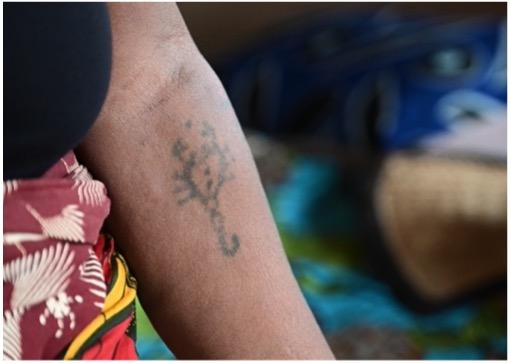
Quand la douleur ressemble à un scorpion
Reece-hermine ADANWENON | 25/12/2025
Écouter les femmes pour reconstruire le soin : une approche palliative au Bénin « Si la douleur était un animal, ce serait quoi ? ». C'est la question que nous avons posée à notre équipe avant de partir en mission. La réponse est venue sans hésitation : « Un scorpion petit, mais quand il pique, ça brûle tout ».Cette image (Image 1) nous a accompagnés tout au long de notre mission, alors que nous écoutions les récits de femmes vivantes avec le cancer au Bénin. Des femmes qui caractérisent une douleur si vive qu'elles supplient pour une amputation, une souffrance si constante qu'elle vole le sommeil, la force, l'identité. Au Bénin, les soins palliatifs ne sont pas synonymes de fin de vie. Ils représentent souvent la seule forme de soin accessible, une porte d'entrée vers un système de santé plus humain, plus digne. Ce que nous avons entenduDans le cadre d'une recherche-action participative menée avec le Programme National de Soins Palliatifs (PNSP) et en lien avec la Plateforme Nationale des Usagers des Services de Santé (PNUSS) , nous avons documenté les parcours des femmes vivantes avec un cancer. À travers des entretiens et la méthode Photovoice, elles ont partagé leurs mots, leurs images, leur réalité : douleurs, courage, isolement, mais aussi espoir et résilience. Une femme dans le Couffo a vécu huit années d'errance médicale, partie d'un simple mal au pouce. Elle a perdu deux doigts, son mari, puis l'usage de son bras avant d'apprendre qu'il s'agissait d'un cancer du sein. Une autre, après quatorze ans de consultations, a tout vendu pour se soigner sans jamais recevoir de diagnostic clair. « Rien que le fait que vous soyez venus m'écouter me réchauffer le cœur », nous a dit l'une d'elles. Une approche béninoise des soins palliatifs Au Bénin, les soins palliatifs sont bien plus qu'un accompagnement de fin de vie. Ils deviennent souvent le premier et unique soin accessible aux personnes atteintes de maladies graves, sans moyens financiers. Les équipes du PNSP apportent : - d' es médicaments antalgiques - morphine (quand disponibles), - une formation aux pansements et à l'autogestion, - un suivi psychosocial et émotionnel, - une présence continue, même dans les zones reculées. Le rôle d'Enabel : structurant et stratégique Depuis 2018, Enabel appuie le ministère de la Santé pour consolider cette approche : - Création d'un laboratoire national de production de morphine orale au CNHU-HKM ; - Mise en place du premier master en soins palliatifs à Parakou (avec l'AFD, 40 professionnels·les formés) ; - Déploiement d'équipes mobiles dans les zones à faible couverture - D ocumentation des parcours de patients pour nourrir les politiques publiques et le plaidoyer. Et le dépistage dans tout ça ?La prise en charge ne commence pas par la douleur. Elle commence par le dépistage précoce . Enabel soutient déjà activement le dépistage du cancer du col de l'utérus dans plusieurs zones du pays. Mais face à l'absence de solution viable pour le dépistage du cancer du sein, nous explorons des pistes innovantes. C'est là qu'intervient AfriMeDD , un projet que nous accompagnons, qui développe une méthode de dépistage précoce par l'olfaction canine . Une solution accessible, adaptée aux réalités rurales, et prometteuse pour rapprocher le diagnostic des communautés.Et maintenant ? Écouter, apprendre, agirCe travail est autant technique qu'humain. Avec le PNUSS , nous réfléchissons à mieux accompagner les patients dans le système, à renforcer les mécanismes de plaintes et à restaurer la confiance dans les services publics. Et à travers cette mission, nous avons réaffirmé une chose simple : Même quand on ne peut pas guérir, on peut toujours soigner.Une leçon de dignitéLa pauvreté n'est pas une fatalité. C'est une construction sociale que nos systèmes peuvent déconstruire. Les soins palliatifs nous montrent qu'on peut transformer un système non pas par la technologie, mais par la présence, l'écoute, la solidarité. Alors, la prochaine fois que l'on parle de « contextes à ressources faibles », rappelons-nous ceci : Ce ne sont pas des systèmes pauvres, ce sont des systèmes trop peu écoutés. Continuons d'écouter ! Continuons d'agir !
-
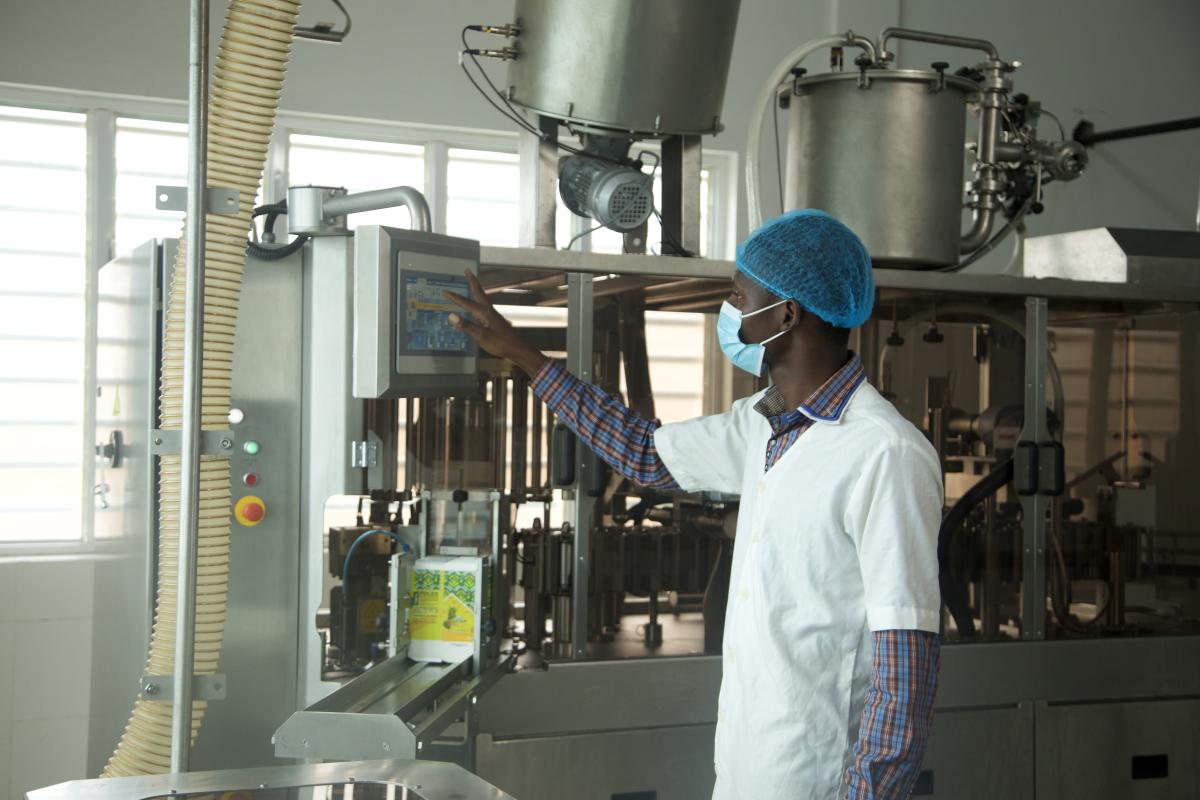
Une nouvelle unité de transformation d'ananas
Reece-hermine ADANWENON | 25/12/2025
À Dessah (Allada), la construction de la dernière unité semi-industrielle soutenue par Enabel est achevée. L'entreprise AS Green Sarl dispose désormais d'une ligne capable de produire 10 000 canettes par jour, doublant ses capacités actuelles et sécurisant les débouchés de 600 producteurs. L'entreprise AS Green Sarl, promotrice de la marque FESTII, fait partie des transformateurs appuyés depuis plusieurs années par Enabel. Agrégatrice d'une importante grappe ananas, elle travaille avec deux grandes coopératives totalisant plus de 600 producteurs. Grâce à l'approche intégrée d'Enabel, la formalisation des relations d'affaires, le coaching, la facilitation du crédit, les infrastructures modernes, l'entreprise à franchise une nouvelle étape dans sa croissance. Après plusieurs contraintes liées à la recherche d'un site approprié, AS Green dispose désormais d'une infrastructure conforme aux normes agroalimentaires, déployée au cœur de la zone de production. Le pari est clair : rapprocher la transformation du gement de matière première pour gagner en efficacité, en qualité et en compétitivité. La nouvelle unité semi ‑ industrielle est équipée d'une ligne de conditionnement moderne capable de produire 10 000 canettes par jour, soit 4,5 tonnes d'ananas traitées quotidiennement plus du double des capacités actuelles de l'entreprise. Un changement d'échelle de rendu possible grâce au cofinancement d'Enabel via PARSAD, complété par un crédit bancaire mobilisé par la promotrice. Les étapes suivantes porteront sur l'installation de la ligne de production automatisée et la finalisation des aménagements complémentaires (clôture, espaces extérieurs, sanitaires). La mise en exploitation rapide de l'usine permettra d'augmenter l'offre de jus naturel sur le marché national et régional, tout en consolidant les débouchés des producteurs partenaires. En finalisant cette unité, PARSAD démontre l'importance de la continuité des investissements pour garantir la durabilité des transformations engagées dans la filière ananas. L'appui d'Enabel contribue directement à rendre les entreprises locales plus compétitives, à sécuriser les revenus des producteurs du cluster et à renforcer la présence de produits béninois de qualité sur les marchés sous ‑régionaux .
-
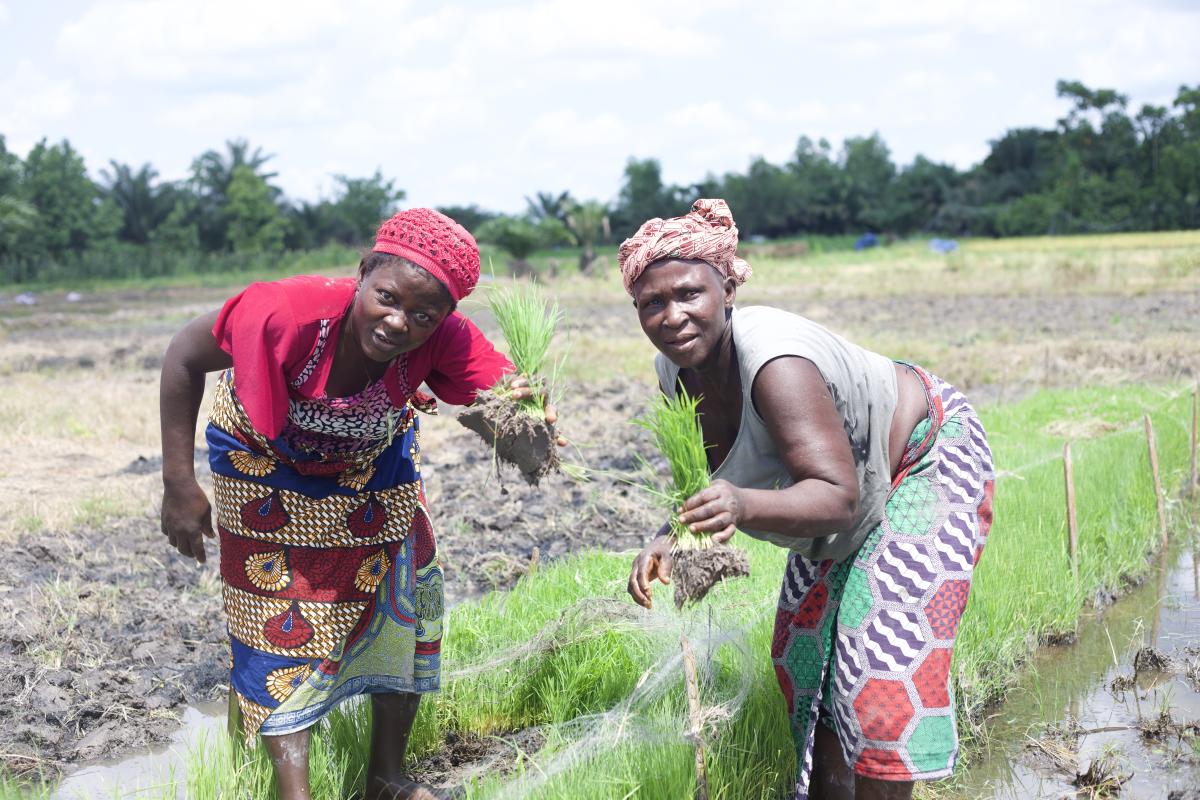
Mung bean et riz : une rotation culturale pour restaurer les sols et diversifier les revenus des riziculteurs
Reece-hermine ADANWENON | 25/12/2025
Dans les bas-fonds rizicoles du PDA4, une transformation silencieuse est en cours. Sur des parcelles autrefois épuisées par les intrants chimiques et affectées par les effets du changement climatique, de nouvelles pousses vertes apparaissent : celles du haricot mungo et du haricot blanc, deux légumineuses capables de régénérer les sols tout en générant un revenu additionnel pour les producteurs. Cette innovation agroécologique, introduite pour la première fois en 2022 dans le cadre du projet TAERA financé par l'Union européenne, est désormais portée à l'échelle par le PARSAD, avec l'appui technique du CCR-B et de Rikolto. Elle s'inscrit dans une ambition claire : rendre la production rizicole plus durable, plus rentable et plus résiliente. Pourquoi cette rotation ? une réponse à l'épuisement des sols L'utilisation excessive d'intrants chimiques et la pression climatique ont fragilisé les écosystèmes agricoles. Les rendements stagnent, la fertilité diminue et la biodiversité recule. Le recours à des légumineuses à cycle court, comme le haricot mungo (2,5 mois) et le haricot blanc (3 mois), constituent une alternative efficace pour fixer l'azote de manière naturelle, améliorant la structure des sols et réduisant la dépendance aux engrais. Pour faciliter l'adoption de cette pratique, le PARSAD s'appuie sur un pool de conseillers agricoles déployé dans les 24 sites de Champs ‑ Écoles Paysans (CEP). Six pilotes du CEP ont été retenus pour accueillir les légumineuses, avec un dispositif rigoureux : - diagnostic participatif préalable ; - sensibilisation sur les bénéfices agronomiques et économiques ; - installation des parcelles d'essai (2/3 haricot mungo, 1/3 haricot blanc sur 2 500 m²) ; - contractualisation avec les Unions Communales Agricoles ; - animation régulière des CEP selon un programme quinzaine ; - implication directe des 203 producteurs participants (dont 52 % de femmes et 14 % de jeunes). Alors que les premières récoltes de haricot mungo débutent, les effets qualitatifs sont déjà visibles : - baisse progressive des besoins en engrais chimiques ; - génération de revenus additionnels dès la première récolte ; - enrichissement des sols en azote et de leur structure ; - disponibilité d'aliments riches en protéines et fibres pour les ménages. Certaines observations, comme la croissance végétative très élevée du niébé à Agondokpo, confirment la richesse du sol en azote et guideront l'accompagnement technique à venir.Prochaines étapes : mesurer, comparer, améliorer. La suite du processus sera déterminante avec le suivi des trois cycles de récolte ; l'enfouissement de la biomasse pour améliorer la matière organique ; l'installation des parcelles de riz pour comparer les rendements avec et sans rotation ; la collecte de données pour un retour d'expérience solide ; et l'exploration d'un modèle d'irrigation d'appoint permettant de sécuriser et de diversifier les revenus face aux aléas climatiques. Avec cette rotation culturelle, PARSAD contribue à un double objectif : restaurer durablement la fertilité des sols et offrir de nouvelles opportunités économiques aux riziculteurs et rizicultrices. Une innovation simple, accessible et adaptée, qui ouvre la voie à une transition agroécologique ancrée dans les réalités locales.
-
PARSAD mis sur orbite : douze conventions de subside pour accélérer la transition agroécologique dans le PDA4
Reece-hermine ADANWENON | 25/12/2025
Dans le pôle de développement agricole 4, une nouvelle étape vient d'être franchie pour impulser la transition agroécologique au Bénin. Le projet PARSAD, mis en œuvre par Enabel, a officialisé la signature de douze conventions de subvention avec des organisations professionnelles agricoles, des structures étatiques et des ONG belges. Une mise en partenariat qui marque un tournant stratégique : celui du « faire ‑ faire » et de la mobilisation ciblée d'expertises locales et internationales. Démarré en 2023, PARSAD ambitionne d'accompagner jeunes, femmes et acteurs économiques dans l'adoption de pratiques durables, la valorisation des métiers agricoles verts et l'intégration d'innovations numériques. La zone d'intervention couvrant les communes du PDA4, concentre une diversité d'acteurs agricoles engagés dans les filières soja, riz, manioc et igname. Pourtant, des défis majeurs demeurent : - capacités techniques limitées, - accès insuffisant aux équipements et financements, - coordination encore fragile autour de la transition agroécologique. Les conventions signées constituent une réponse structurée à ces enjeux : 4,39 millions d'euros mobilisés par le Royaume de Belgique pour renforcer durablement les filières et les moyens d'existence des populations. À travers la mise en œuvre de ces partenariats, PARSAD vise à : - renforcer les compétences techniques et institutionnelles des acteurs des filières, - diffuser des innovations agroécologiques adaptées, - améliorer la résilience économique des ménages ruraux, en particulier les femmes, - faciliter l'accès aux équipements modernes et innovants, - promouvoir des services financiers adaptés aux réalités des producteurs, - améliorer la coordination inter ‑ acteurs autour de la transition agroécologique. Les partenaires deviennent ainsi des facilitateurs, tandis que les acteurs du changement restent les véritables populations locales. Pour assurer l'atteinte des résultats, un mécanisme de surveillance est en cours de déploiement. Piloté par le comité technique du projet, il permettra d'évaluer l'avancement des conventions, d'ajuster les actions en temps utile et de garantir une parfaite synergie entre les partenaires. Une plateforme numérique de suivi est également en développement afin de centraliser les données, documenter les progrès et faciliter la prise de décision. Avec ces conventions, PARSAD entre dans une phase décisive : celle de l'action concertée et de la mise en œuvre opérationnelle. Les prochains mois révéleront les premières transformations, guidées par l'expertise des partenaires et l'engagement des communautés.
-
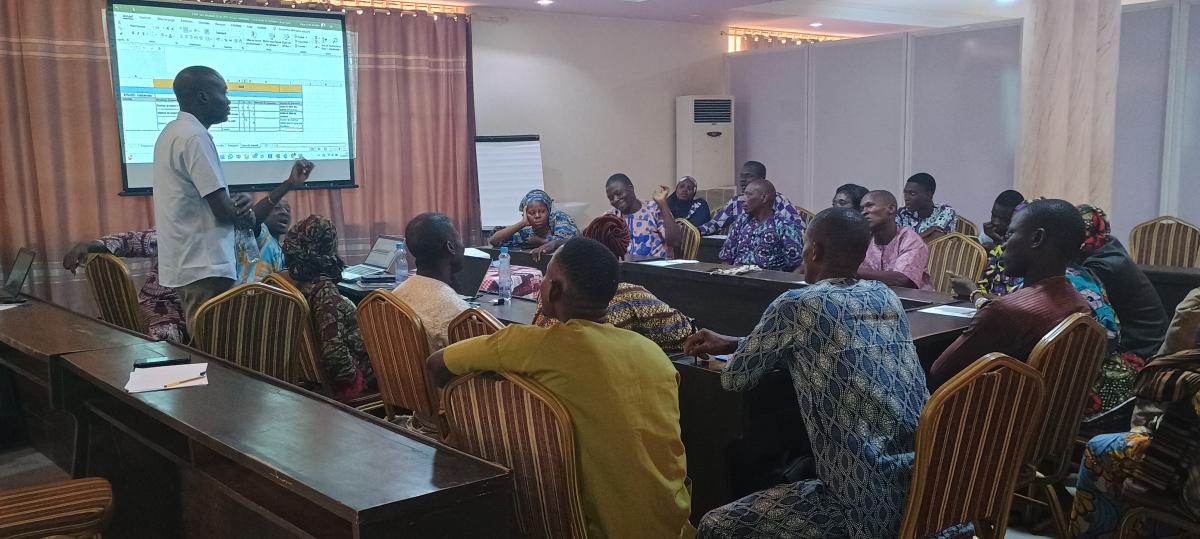
Les acteurs du PDA4 s’approprient la stratégie nationale pour accélérer l’AEB
Reece-hermine ADANWENON | 25/12/2025
Au cœur du PDA4 (Pôle de Développement Agricole 4), une dynamique collective se renforce autour d'un enjeu majeur : faire de l'Agriculture Écologique et Biologique (AEB) un véritable moteur de développement durable. Face aux difficultés persistantes du sous‑secteur, faible structuration des acteurs, manque d'intégration dans la recherche et les formations, faible visibilité des produits, Enabel et ses partenaires ont mobilisé l'ensemble des parties prenantes pour une appropriation active de la SNDAEB 2023-2030 . Pendant deux sessions de travail, 104 acteurs départementaux et communaux ont été outilslés pour mieux exercer leurs rôles et accompagner la mise en œuvre de la stratégie. La diffusion de 1 500 brochures et 3 000 dépliants renforce cette dynamique d'information et d'engagement. Un résultat phare : un territoire mieux préparé à mettre en œuvre la SNDAEB L'initiative marque une étape essentielle : les acteurs du PDA4 disposent désormais d'une vision commune et d'un référentiel partagé pour renforcer l'AEB. Ils sont mieux outilslés pour soutenir les producteurs, impulser des actions locales et participer à la montée en puissance du sous - secteur. La prochaine étape s'annonce déterminante : l'internalisation de la SNDAEB au niveau communal, afin que chaque territoire devienne un maillon actif de la transformation agricole durable.
-
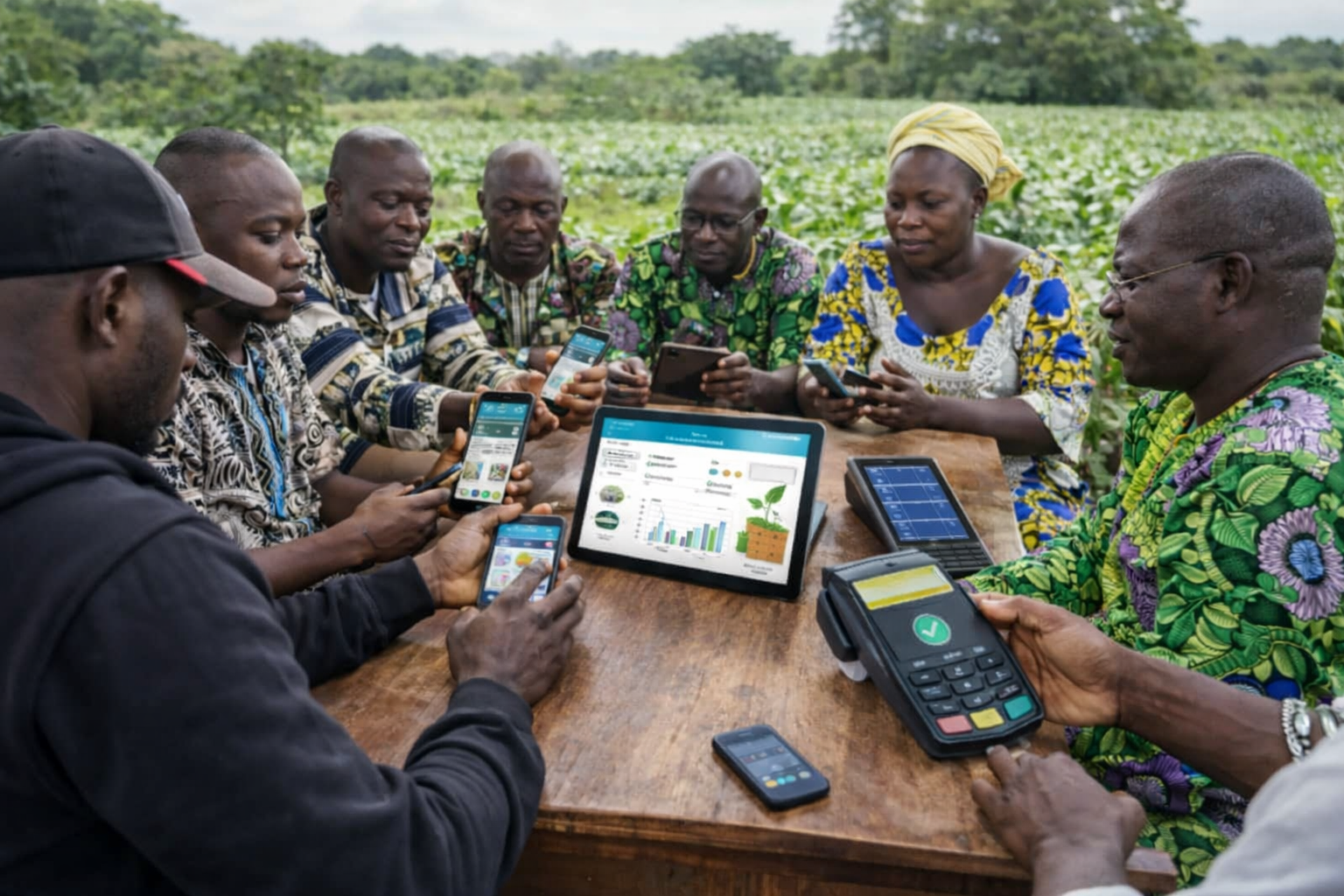
Zibaa Cash : une solution digitale pour renforcer l’inclusion financière des producteurs agricoles
Reece-hermine ADANWENON | 25/12/2025
Dans le cadre du Projet d'Appui à une Agriculture Résiliente et aux Systèmes Alimentaires Durables (PARSAD), Enabel accompagne la mise en place de Zibaa Cash , un portefeuille électronique conçu pour améliorer la transparence, la sécurité et l'efficacité des transactions au sein des chaînes de valeur agricole. L'initiative répond à des défis structurels : faible bancarisation des producteurs, prédominance des paiements en espèces, outils de gestion limités pour les agrégateurs et absence de solutions numériques adaptées au contexte rural. Zibaa Cash vise à faciliter l'accès des producteurs et de leurs partenaires à des services financiers numériques fiables. Développée à partir d'une démarche participative, la solution intègre trois interfaces (web, mobile et USSD), permettant une utilisation accessible à l'ensemble des profils d'acteurs : producteurs organisés ou non, transformateurs, fournisseurs d'intrants et institutions de microfinance. Elle contribue à : - sécuriser les paiements en limitant les transactions en espèces, - renforcer la traçabilité des flux financiers, - améliorer le suivi des contrats, des avancées en entrants et des livraisons, - simplifier les paiements via le mobile banking et l'intégration des systèmes financiers locaux. Le développement de Zibaa Cash a reposé sur une immersion approfondie auprès des parties prenantes, suivie d'ateliers d'éco ‑ conception associé transformateurs, producteurs, fournisseurs et IMF. Cette approche collaborative a permis d'ajuster les interfaces aux pratiques réelles des utilisateurs et d'élaborer un modèle économique durable. La première version de la solution est désormais opérationnelle. Une phase pilote démarre dans trois clusters rizicoles accompagnés par le PARSAD. Elle s'appuie sur : - un dispositif d'appui de proximité, - des formations pratiques pour les utilisateurs, - l'enrôlement encadré par des animateurs locaux, - un suivi continu pour adapter la solution aux réalités de terrain. À l'issue de la phase pilote, une extension progressive est envisagée vers d'autres clusters et filières agricoles, avec l'intégration de nouveaux partenaires financiers. Zibaa Cash ambitionne ainsi de devenir un levier majeur d'inclusion financière numérique, au service d'une agriculture plus performante, sécurisée et transparente.
-

De la terre au futur : quand les jeunes du Mono réinventent l’agriculture durable
Reece-hermine ADANWENON | 25/12/2025
« Avant, je ne savais pas comment transformer mes idées en projet. Aujourd'hui, je me vois comme une entrepreneure capable de nourrir ma communauté autrement. », a confié Agnès, 24 ans, formée en transformation agroalimentaire à Lokossa. Sous le grand manguier de la cour du centre de formation de Lokossa, une dizaine de jeunes écoutent attentivement leur formateur expliquer la fabrication d'aliments bio pour volailles. Agnès, sourire aux lèvres, prend des notes avec application. Comme elle, ils sont 200 jeunes issus des six communes de la Réserve de biosphère du Mono à savoir Grand-Popo, Comè, Houéyogbé, Athiémè, Lokossa et Djakotomey à avoir choisi d'apprendre un métier orienté vers la transition agroécologique et les systèmes alimentaires durables.Une jeunesse en action pour un avenir vert Grâce au Projet Delta Mono , financé par l'Union européenne et la Coopération luxembourgeoise, et mis en œuvre par Enabel, ces jeunes bénéficient d'un accompagnement complet : formation, encadrement et appui à l'insertion professionnelle . L'initiative, portée localement par le GEL Sud Bénin vise à créer des opportunités économiques durables tout en préservant les écosystèmes uniques de la Bouche du Roy, du lac Tôho, de la forêt de Naglanou et de la mare d'Adjamè. Parmi les 512 candidatures reçues après une large campagne de sensibilisation avec les cellules communales, les associations de gestion des aires de conservation et les radios locales , les 200 jeunes retenus suivent une formation dans six filières porteuses : aviculture, pisciculture, apiculture, transformation agroalimentaire, production d'intrants organiques et achatiniculture (élevage d'escargots) Former pour transformer Depuis décembre 2024, les participants alternent cours théoriques, travaux pratiques et étapes en entreprise . Chaque étape du parcours est pensée pour renforcer à la fois les compétences techniques et les « compétences de vie » : confiance en soi, travail en équipe, gestion du temps, esprit d'initiative. À l'issue du programme, les jeunes obtiennent une attestation de compétence , première clé vers l'emploi ou l'auto-emploi… Mais la formation ne s'arrête pas là. Ceux qui souhaitent créer leur propre activité reçoivent un kit d'amorçage en équipements ou intrants pour lancer leur micro-entreprise. Les autres sont accompagnés vers l'emploi salarié via les Unités Locales de Promotion de l'emploi et les réseaux d'entreprises partenaires . « Notre ambition est claire : donner à ces jeunes les moyens de bâtir une économie locale résiliente, respectueuse de l'environnement et créatrice de valeur. », explique Gery NIEUWENHUYEN, Projetc Manager du projet Delta Mono.Un souffle nouveau pour les territoires ruraux Derrière les chiffres, ce sont des visages, des espoirs, des familles qui retrouvent confiance en l'avenir. En formant plus de 45 % de femmes parmi les bénéficiaires, le projet favorise aussi l'inclusion économique des jeunes filles rurales , souvent éloignées des circuits de formation classique. Le pari est simple : quand la jeunesse aux outils, la terre redevient promesse . Les initiatives comme Delta Mono montrent qu'un autre modèle agricole est possible plus durable, plus équitable et plus humain. Agir ensemble Enabel et ses partenaires poursuivent leur engagement aux côtés du gouvernement béninois pour renforcer les compétences locales, stimuler l'entrepreneuriat vert et construire des filières agroécologiques inclusives.
-
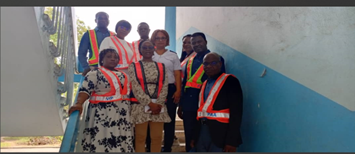
Cap sur la mixité : quand le Bénin et la Côte d’Ivoire s'unissent pour ouvrir l'horizon portuaire aux femmes
Reece-hermine ADANWENON | 25/12/2025
Longtemps perçus comme des bastions masculins, les métiers de la mer et du port s'ouvrent à une nouvelle génération au Bénin. Sous l'impulsion du projet PASPort II d'Enabel, une délégation béninoise est allée puiser l'inspiration en Côte d'Ivoire pour transformer durablement l'accès des jeunes filles aux carrières maritimes.Le constat : un horizon à élargirDans l'imaginaire collectif, le port est souvent associé à la force physique et à un univers exclusivement masculin. Pourtant, au Port Autonome de Cotonou comme ailleurs, les opportunités sont vastes et les compétences n'ont pas de genre. Le défi pour le Bénin ? Briser les plafonds de verre et construire une politique nationale capable d'attirer, de former et d'insérer les jeunes filles dans ces métiers stratégiques.L'approche : apprendre des meilleurs pour tracer sa propre voieC'est dans cet esprit que le projet PASPort II, en collaboration avec le programme ProPORT, a facilité une immersion stratégique à Abidjan. L'objectif était clair : s'imprégner de l'expérience ivoirienne pour co-construire un modèle béninois de promotion des métiers bleus.Experts métiers, responsables RH et acteurs de la formation ont ainsi sillonné les institutions clés d'Abidjan : du Port Autonome d'Abidjan (PAA) à l'Académie Régionale des Sciences et Techniques de la Mer (ARSTM).La rencontre : des visages derrière les fonctionsLe moment fort de cette mission fut sans doute la rencontre avec des pionnières qui prouvent que l'excellence n'a pas de frontières. À l'image du lieutenant-colonel Isabelle Akahi, première femme capitaine au long cours en Côte d'Ivoire, ces professionnelles ont partagé leur parcours, transformant des concepts abstraits en modèles de réussite concrets."Voir une femme commandant un navire ou diriger des opérations portuaires n'est plus un rêve, c'est une réalité que nous voulons importer au Bénin."L'impact : des modèles concrets pour le BéninPlus qu'une simple visite, ce voyage a permis de rapporter des outils précieux pour la future politique nationale du Bénin :• La formation double : Un modèle "école de la deuxième chance" où 75% du temps se passe en entreprise, garantissant une insertion immédiate.• Le parrainage : Un mécanisme où les entreprises maritimes accompagnent directement les jeunes filles dès le début de leur formation.• Partenariats Sud-Sud : Des ébauches d'accords solides avec les institutions ivoiriennes pour co-créer des référentiels de formation adaptés.Prochain arrêt : un océan d'opportunitésCette expérience ivoirienne n'est qu'une étape. Forte de ces enseignements, la délégation béninoise s'apprête désormais à explorer les modèles marocains pour finaliser une politique de promotion des métiers portuaires innovants et inclusifs.
